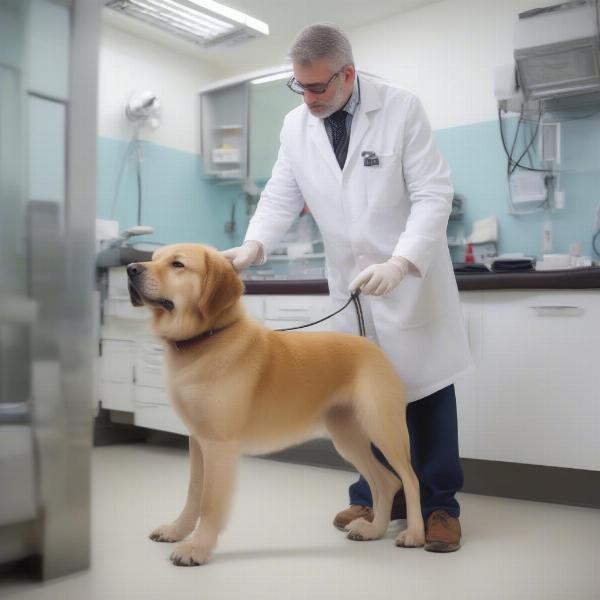The term “dog shot execution style” is disturbing and often misinterpreted. While it might evoke images of deliberate cruelty, it’s crucial to understand its true meaning within the context of veterinary euthanasia and, sometimes, unfortunately, in cases of animal cruelty. This article aims to clarify the term, differentiate its usage, and provide resources for responsible pet ownership.
It’s important to distinguish between the appropriate use of the term in veterinary medicine and its misuse in describing acts of animal cruelty. In a veterinary setting, “execution style” may be used to describe a specific method of euthanasia where a quick and painless injection is administered directly to the brain. This method, when performed by a trained professional, is considered humane and is sometimes necessary in emergency situations or when other methods are not feasible. However, outside of this controlled environment, the term often refers to illegal and inhumane acts of violence against animals. These acts are unacceptable and should be reported to the appropriate authorities.
Euthanasia: A Difficult but Sometimes Necessary Decision
Sometimes, pet owners face the heartbreaking decision to euthanize their beloved companions. This choice is often made when a pet is suffering from an incurable illness or injury, and their quality of life has significantly diminished. Euthanasia, when performed by a veterinarian, is a peaceful and painless process designed to minimize suffering. It’s a deeply personal decision, and pet owners should discuss their options thoroughly with their veterinarian to ensure the most humane and compassionate approach.
Recognizing and Reporting Animal Cruelty
The term “dog shot execution style” is often misused when describing acts of animal cruelty. These acts are illegal and involve intentional harm or neglect, causing unnecessary pain and suffering. Recognizing the signs of animal cruelty is essential for protecting animals. These signs can include unexplained injuries, fearfulness, emaciation, and neglect of basic needs such as food, water, and shelter. If you suspect animal cruelty, it’s crucial to report it to your local animal control or law enforcement agencies immediately.
Choosing the Right Veterinary Care
 Dog being examined in a veterinary clinic
Dog being examined in a veterinary clinic
Finding a compassionate and experienced veterinarian is vital for responsible pet ownership. A good veterinarian will provide preventative care, diagnose and treat illnesses, and offer guidance on end-of-life decisions, including euthanasia when necessary. They will explain the process clearly and compassionately, ensuring you understand all your options.
Coping with Pet Loss
Losing a pet is a devastating experience. Grief is a natural response, and it’s important to allow yourself time to mourn. Support groups, pet loss hotlines, and online forums can provide comfort and connection during this difficult time. Remembering the joy and companionship your pet brought into your life can help you navigate the grieving process and cherish the memories you shared.
FAQ
-
What is the most humane method of euthanasia for dogs? Intravenous injection of a barbiturate solution is the most commonly used and generally considered the most humane method of euthanasia for dogs.
-
How do I know when it’s time to consider euthanasia for my dog? This is a difficult decision that should be made in consultation with your veterinarian. Consider your dog’s quality of life, including their ability to eat, drink, sleep, move comfortably, and interact with their loved ones.
-
What should I do if I suspect animal cruelty? Report your concerns to your local animal control agency or law enforcement immediately. Provide as much detail as possible, including the location, date, time, and description of the incident.
-
How can I find a reputable veterinarian in my area? Ask for recommendations from friends, family, or local animal shelters. You can also search online directories and review websites to find veterinarians with positive reviews and credentials.
-
What resources are available for coping with pet loss? Pet loss support groups, hotlines, and online forums can provide comfort and support during the grieving process. Your veterinarian can also provide resources and referrals.
Related Articles on ILM Dog
- (If available, link to related articles on the website, e.g., articles on choosing a vet, coping with pet loss, senior dog care)
About ILM Dog
ILM Dog is your trusted source for expert advice on all aspects of dog care and wellbeing. We offer a wealth of resources on dog breeds, health, training, nutrition, grooming, and much more. From puppyhood to senior care, we’re here to help you provide the best possible care for your canine companion. Contact us for personalized guidance at [email protected] or +44 20-3965-8624. Visit ILM Dog for more information.